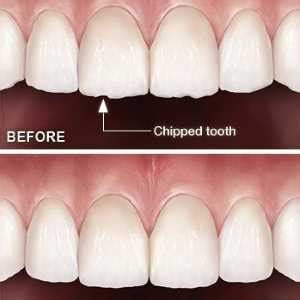Chipped Tooth Repair: Is it Worth the Cost?
A chipped tooth can be more than just a cosmetic nuisance; it can lead to pain, infection, and further damage if left untreated. The decision of whether or not to repair a chipped tooth often comes down to cost versus the long-term consequences of inaction. This article will explore the various options for chipped tooth repair, the associated costs, and help you determine if the investment is worthwhile for your specific situation.
What are the Different Ways to Repair a Chipped Tooth?
The best method for repairing a chipped tooth depends on the severity of the chip. Your dentist will assess the damage and recommend the most appropriate treatment. Common options include:
-
Dental Bonding: This is a relatively quick and affordable procedure. Your dentist applies a tooth-colored resin to the chipped area, sculpts it to match your natural tooth, and hardens it with a special light. It's ideal for small chips and cosmetic imperfections.
-
Dental Veneers: These thin, custom-made shells are bonded to the front surface of the tooth to cover imperfections, including chips. Veneers are more expensive than bonding but offer a more durable and natural-looking result. They are suitable for larger chips or multiple cosmetic issues.
-
Dental Crowns: For significant chips or damage that extends below the gum line, a crown might be necessary. A crown is a cap that completely covers the tooth, restoring its shape, size, and strength. Crowns are the most expensive option but provide the best long-term protection.
-
Tooth-Colored Fillings: Similar to bonding, but often used for chips that involve a small cavity or crack. The dentist cleans the area, removes any decay, and fills the gap with a composite resin matching the tooth's color.
How Much Does Chipped Tooth Repair Cost?
The cost of chipped tooth repair varies significantly depending on several factors, including:
- The extent of the damage: Small chips requiring bonding will be considerably cheaper than extensive damage needing a crown.
- The chosen treatment method: Bonding is the most affordable, followed by fillings, veneers, and crowns.
- Your location: Costs can vary geographically.
- Your dental insurance coverage: Many insurance plans cover at least a portion of the costs, especially for restorative procedures like crowns and fillings.
While providing exact figures is impossible without a professional assessment, you can expect the following general ranges (prices are estimates and may vary):
- Dental Bonding: $100-$300 per tooth
- Tooth-Colored Fillings: $150-$400 per tooth
- Dental Veneers: $800-$2000 per tooth
- Dental Crowns: $1000-$3000 per tooth
Is it Worth the Cost to Repair a Chipped Tooth?
The decision of whether or not to repair a chipped tooth is a personal one, weighing the costs against the potential risks of leaving it untreated. Consider these factors:
- Pain and Sensitivity: A chipped tooth can cause significant pain and sensitivity to hot, cold, or sweet foods.
- Infection: Exposed dentin (the layer beneath the enamel) is vulnerable to infection, which can lead to more serious dental problems.
- Further Damage: A small chip can worsen over time, leading to a larger fracture or even tooth loss.
- Cosmetic Concerns: A chipped tooth can affect your smile and self-confidence.
Ignoring a chipped tooth might seem like a cost-saving measure in the short term, but delaying treatment can often lead to more extensive (and expensive) procedures down the line. The cost of repairing a severely damaged tooth is significantly higher than addressing a small chip early on.
How Can I Afford Chipped Tooth Repair?
If cost is a concern, explore these options:
- Check your dental insurance coverage: Contact your insurance provider to understand your benefits and coverage for dental procedures.
- Payment plans: Many dental practices offer flexible payment plans to make treatment more affordable.
- Dental financing options: Several companies specialize in financing dental procedures.
- Look for discounts or specials: Check with local dental practices for discounts or promotions.
What Happens if I Don't Repair a Chipped Tooth?
Leaving a chipped tooth untreated can have several negative consequences, including:
- Increased Pain and Sensitivity: The exposed dentin can become increasingly sensitive to temperature and pressure.
- Infection and Abscess: Bacteria can easily enter the exposed area, leading to an infection or abscess, requiring more extensive and expensive treatment, like root canal therapy.
- Tooth Loss: In severe cases, the damaged tooth may become so weak that it cracks further and eventually falls out.
How Long Does Chipped Tooth Repair Last?
The longevity of chipped tooth repair depends on the treatment method and your oral hygiene practices. Dental bonding typically lasts several years, while veneers can last a decade or more with proper care. Crowns are the most durable option, potentially lasting for 15 years or longer. Maintaining good oral hygiene—brushing, flossing, and regular dental checkups—significantly extends the lifespan of any repair.
This information is for general knowledge and does not constitute medical advice. Always consult with a qualified dentist for a proper diagnosis and treatment plan for your specific situation. They can assess the damage, discuss your options, and help you make an informed decision about the best course of action for your chipped tooth.

